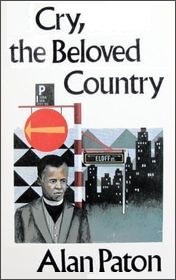Alan Paton "Cry the Beloved Country"

Â
 Alan Paton
Alan Paton
Stephen Kumalo, minister of the church in Ndotsheni, a small village in the South African province of Natal, receives a letter telling him that his sister is ill in Johannesburg. His son, Absalom, is also in Johannesburg, and Kumalo has not had news of him for some time. Kumalo must go to the city, but he has never travelled so far.
We follow Kumalo in his search for Gertrude and Absalom. We also meet his brother, John, who has become involved in politics and has lost his Christian faith. In the city, Kumalo meets people who take advantage of his simple, trusting nature, and others who help him and his family. On his journey he makes terrible discoveries.
The background to the fictional story of ‘Cry, the Beloved Country’ is the injustice of the divided society of South Africa, and the breakdown of the black tribal system. The population of South Africa includes people of many different origins: African, European, Indian and mixed race, but the largest group (almost 80%) are black Africans. Racial problems between the white minority and the black majority are an important part of the political history of South Africa.
In ‘Cry, the Beloved Country’, through the stories of Stephen Kumalo and his white neighbour, Alan Paton shows how harmful the policy of separation was for South African society - for the white population as well as for the black. There are many biblical references and echoes in the novel and the style of writing; like Stephen Kumalo, Paton was a Christian. Kumalo’s son, Absalom, is named after the son of King David, who rebelled against his father. St Stephen was an early Christian who died for his beliefs.
When Alan Patons book was first published, many white South Africans regarded it as either too emotional or too revolutionary Later, in the 1970s and 80s, black readers doubted Paton’s politics. However, more recently, Nelson Mandela has praised the book for its faith in the essential goodness of people, and its author.
Â
Text Analysis: Unique words: about 3,000. Total words: about 27,430
Hard words: aside, avenue, beloved, bless, bus rank, bull, compass, compound, dam, destruction, demonstrator, dwelling-place, farewell, forlorn, liquor, mission, mute, policy, plough, reform, restore, Reverend, shanty town, shilling, structure, summit, township, titihoya, tribe, umfundisi, wearily, welfare
Â
 Â